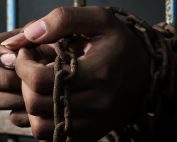Day 19: A faith that works – Part 7a
The proof of the pudding is in the eating
Bible References (NIV)
47 When he heard that it was Jesus of Nazareth, he began to shout, “Jesus, Son of David, have mercy on me!”
48 Many rebuked him and told him to be quiet, but he shouted all the more, “Son of David, have mercy on me!”
49 Jesus stopped and said, “Call him.”So they called to the blind man, “Cheer up! On your feet! He’s calling you.”
50 Throwing his cloak aside, he jumped to his feet and came to Jesus.
51 “What do you want me to do for you?” Jesus asked him. The blind man said, “Rabbi, I want to see.”
52 “Go,” said Jesus, “your faith has healed you.” Immediately he received his sight and followed Jesus along the road.
32 There some people brought to him a man who was deaf and could hardly talk, and they begged Jesus to place his hand on him.
33 After he took him aside, away from the crowd, Jesus put his fingers into the man’s ears. Then he spit and touched the man’s tongue.
34 He looked up to heaven and with a deep sigh said to him, “Ephphatha!” (which means “Be opened!”).
35 At this, the man’s ears were opened, his tongue was loosened and he began to speak plainly.
36 Jesus commanded them not to tell anyone. But the more he did so, the more they kept talking about it.
37 People were overwhelmed with amazement. “He has done everything well,” they said. “He even makes the deaf hear and the mute speak.”
2 Now there is in Jerusalem near the Sheep Gate a pool, which in Aramaic is called Bethesda and which is surrounded by five covered colonnades.
3 Here a great number of disabled people used to lie—the blind, the lame, the paralyzed.
5 One who was there had been an invalid for thirty-eight years.
6 When Jesus saw him lying there and learned that he had been in this condition for a long time, he asked him, “Do you want to get well?”
7 “Sir,” the invalid replied, “I have no one to help me into the pool when the water is stirred. While I am trying to get in, someone else goes down ahead of me.”
8 Then Jesus said to him, “Get up! Pick up your mat and walk.”
9 At once the man was cured; he picked up his mat and walked. The day on which this took place was a Sabbath
Devotional
Have you ever been a sceptic of something that you then tried, and it caused you to change your mind? There is a big difference between knowing about something and experiencing it. I’d heard snowboarding down a steep slope could be exhilarating, but the experience was better. I’d heard that coral reefs and fish were stunning to see in person, but then I was taken snorkelling, and the experience was better. The Christian faith is like this. For everything stated so far in this series, the experience is better!
While it is important to know that the Christian faith makes rational sense, it’s also important that it is experientially real. Because there is so much to the experience of this faith it will be the topic of our final six devotions in the concluding of this series.
For a first area of experience, we have noted that if a God exists then miracles are possible. Jesus performed many amazing miracles. The Old Testament is also full of miracles. The period of the Exodus, where God’s people walked through desert areas depending on God’s supernatural provision and protection stands out. The Christian faith is one of miracles. Take the miracles out and not a lot is left.
Miraculous healings still happen today and this is evidence pointing toward the truth of this faith.
It is notable, however, that miracles resulting from a prayer in Jesus’ name seem rare in some parts of the world. They are rare in the West, for example. Many suspect this is because we’ve become a very sceptical culture. This undermines something of our faith.
However, even if I don’t experience physical healing myself, someone else might.
A ministry that has encouraged me is that of Reinhard Bonnke, who was a German evangelist to Africa. As noted in a prior devotion, I’ve seen videos of people who were prayed for in Jesus’ name, with blind people then seeing for the first time, deaf hearing, mute speaking and lame walking. Jesus continues to heal in the very same ways you read in your Bible readings today. Even if physical miracles are rare, they do still happen and it’s evidence.
I recall a friend who had a sporting accident resulting in what an X-ray showed to be a fractured ankle while a snapping sound indicated possible additional torn tendons. A while later, following prayer, all pain left. At the next scan, nothing was found that was wrong and the ankle brace was removed. The Doctor put it down to a faulty first X-ray – and this is understandable. However, my friend experienced the change at the moment of prayer and knew the resulting difference!
While miraculous healings do seem rare they do happen, and they are evidence! Jesus said his followers would lay their hands on the sick (to pray) and they would recover (Mark 16:17-18). It takes courage to pray for the sick. It can be disappointing when they are not healed. But sometimes they are!
Video clip: A faith that works – Part 7a — 3mins
Reflection questions
- How important is the experiential evidence of this faith as compared to the rational evidence, and why?
- What miracles have you seen, whether with your own eyes or on video?
- In the examples cited, miracles happened specifically after a prayer in Jesus’ name — not any other name. What spiritual truth or reality does this suggest?
For prayer
“Thank you, Lord Jesus, for the miracles you performed when on earth, and also for the way you still sometimes miraculously heal sick people today. While we wish this happened more, we thank you for the evidence this remains. It is generous of you. Thank you.”
related topics
coming up in our next devotion
Day 20: A faith that works – Part 7b
If something is logically true it should also be experientially real. Otherwise, it’s just a theory. This is true of the Christian faith in the profoundest of ways. It is not without reason that it is globally known as the faith of good works, love and charity. When it is applied, it works!



